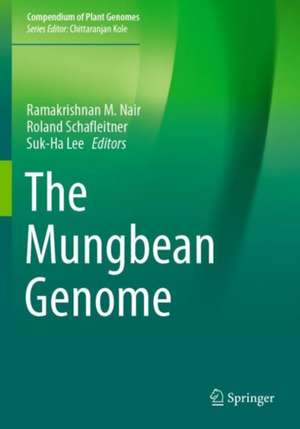The Mungbean Genome: Compendium of Plant Genomes
Editat de Ramakrishnan M. Nair, Roland Schafleitner, Suk-Ha Leeen Limba Engleză Paperback – 26 aug 2021
| Toate formatele și edițiile | Preț | Express |
|---|---|---|
| Paperback (1) | 943.07 lei 6-8 săpt. | |
| Springer International Publishing – 26 aug 2021 | 943.07 lei 6-8 săpt. | |
| Hardback (1) | 950.33 lei 6-8 săpt. | |
| Springer International Publishing – 22 feb 2020 | 950.33 lei 6-8 săpt. |
Din seria Compendium of Plant Genomes
- 24%
 Preț: 783.65 lei
Preț: 783.65 lei - 18%
 Preț: 948.92 lei
Preț: 948.92 lei - 15%
 Preț: 643.34 lei
Preț: 643.34 lei - 15%
 Preț: 643.84 lei
Preț: 643.84 lei - 18%
 Preț: 950.21 lei
Preț: 950.21 lei - 18%
 Preț: 956.18 lei
Preț: 956.18 lei - 18%
 Preț: 1398.00 lei
Preț: 1398.00 lei - 18%
 Preț: 1396.89 lei
Preț: 1396.89 lei - 15%
 Preț: 645.28 lei
Preț: 645.28 lei - 18%
 Preț: 1119.74 lei
Preț: 1119.74 lei - 18%
 Preț: 947.98 lei
Preț: 947.98 lei - 18%
 Preț: 954.93 lei
Preț: 954.93 lei - 18%
 Preț: 957.44 lei
Preț: 957.44 lei - 18%
 Preț: 1114.97 lei
Preț: 1114.97 lei - 18%
 Preț: 956.69 lei
Preț: 956.69 lei - 18%
 Preț: 951.91 lei
Preț: 951.91 lei - 18%
 Preț: 952.89 lei
Preț: 952.89 lei - 18%
 Preț: 952.57 lei
Preț: 952.57 lei - 18%
 Preț: 953.97 lei
Preț: 953.97 lei - 18%
 Preț: 950.33 lei
Preț: 950.33 lei - 18%
 Preț: 1228.96 lei
Preț: 1228.96 lei - 18%
 Preț: 951.77 lei
Preț: 951.77 lei - 18%
 Preț: 955.56 lei
Preț: 955.56 lei - 15%
 Preț: 643.48 lei
Preț: 643.48 lei - 15%
 Preț: 646.30 lei
Preț: 646.30 lei - 18%
 Preț: 1113.26 lei
Preț: 1113.26 lei - 15%
 Preț: 643.65 lei
Preț: 643.65 lei - 15%
 Preț: 633.53 lei
Preț: 633.53 lei - 18%
 Preț: 956.03 lei
Preț: 956.03 lei - 18%
 Preț: 951.59 lei
Preț: 951.59 lei - 18%
 Preț: 1119.56 lei
Preț: 1119.56 lei - 18%
 Preț: 1115.46 lei
Preț: 1115.46 lei - 18%
 Preț: 946.41 lei
Preț: 946.41 lei - 18%
 Preț: 950.33 lei
Preț: 950.33 lei - 18%
 Preț: 955.56 lei
Preț: 955.56 lei - 18%
 Preț: 951.77 lei
Preț: 951.77 lei - 18%
 Preț: 947.98 lei
Preț: 947.98 lei - 18%
 Preț: 1669.96 lei
Preț: 1669.96 lei - 18%
 Preț: 1123.98 lei
Preț: 1123.98 lei - 18%
 Preț: 1114.52 lei
Preț: 1114.52 lei - 18%
 Preț: 954.62 lei
Preț: 954.62 lei
Preț: 943.07 lei
Preț vechi: 1150.09 lei
-18% Nou
Puncte Express: 1415
Preț estimativ în valută:
180.47€ • 187.35$ • 150.49£
180.47€ • 187.35$ • 150.49£
Carte tipărită la comandă
Livrare economică 22 martie-05 aprilie
Preluare comenzi: 021 569.72.76
Specificații
ISBN-13: 9783030200107
ISBN-10: 3030200108
Pagini: 191
Ilustrații: XVIII, 191 p. 24 illus., 14 illus. in color.
Dimensiuni: 178 x 254 mm
Greutate: 0.38 kg
Ediția:1st ed. 2020
Editura: Springer International Publishing
Colecția Springer
Seria Compendium of Plant Genomes
Locul publicării:Cham, Switzerland
ISBN-10: 3030200108
Pagini: 191
Ilustrații: XVIII, 191 p. 24 illus., 14 illus. in color.
Dimensiuni: 178 x 254 mm
Greutate: 0.38 kg
Ediția:1st ed. 2020
Editura: Springer International Publishing
Colecția Springer
Seria Compendium of Plant Genomes
Locul publicării:Cham, Switzerland
Cuprins
Global status and Economic Importance of Mungbean.- Genetic Resources and Utilization.- Breeding Progress and Future challenges-Biotic stresses.- Breeding Progress and Future challenges-Abiotic stresses.- Breeding Progress and Future challenges-Nutritional quality.- Molecular marker resources and their application.- Mungbean Genome and synteny with other genomes.- Resequencing mungbean.- Genomic approaches to biotic stresses.- Genomic approaches to abiotic stresses.- Future prospects and challenges.
Textul de pe ultima copertă
This book reports on the current global status of mungbean and its economic importance. Mungbean (Vigna radiata)—also called green gram—is an important food and cash crop in the rice-based farming systems of South and Southeast Asia, but is also grown in other parts of the world. Its short duration, low input requirement and high global demand make mungbean an ideal rotation crop for smallholder farmers. The book describes mungbean collections maintained by various organizations and their utilization, especially with regard to adapting mungbean to new environments. It provides an overview of the progress made in breeding for tolerance to biotic and abiotic stresses; nutritional quality enhancement including genomics approaches; and outlines future challenges for mungbean cultivation. In addition, genomic approaches to evaluating the evolutionary relationship between Vigna species and addressing questions concerning domestication, adaptation and genotype–phenotype relationships are also discussed
Caracteristici
Presents an overview of mungbean breeding in the last 20 years Offers extensive information on mungbean, with a focus on biodiversity, breeding, and genomics Provides an update on Vigna genomics that addresses diversity, evolution, adaptation, and genotype–phenotype relationships
